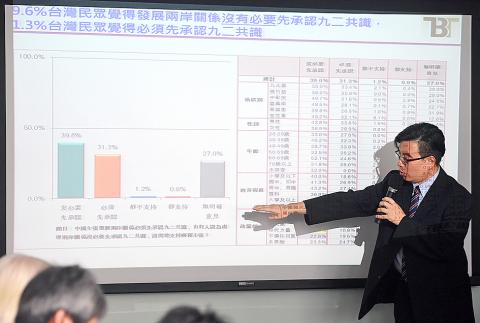An overwhelming majority of Taiwanese believe Taiwan is a sovereign and independent nation, the results of a poll released yesterday by the Taiwan Brain Trust think tank showed, with 75.8 percent of respondents supporting the sentiment, while 18.9 percent disagreed.
On the issue of Taiwan’s status as a nation, the poll showed that 79.8 percent of respondents said that it is “definitely” or “probably” a sovereign nation, while only 18.9 percent said that either it is “definitely not” or “probably not” a sovereign nation.
The answers indicated that most Taiwanese disagree with a recent statement by China’s Taiwan Affairs Office spokesperson An Fengshan (安峰山), who said that “Taiwan has never been a nation.”

Photo: Liao Chen-huei, Taipei Times
Regarding President Tsai Ing-wen’s (蔡英文) policies on cross-strait relations, the poll showed that 49.4 percent of respondents support her, while 25.5 percent do not.
However, 79.8 percent of respondents said that Taiwan should maintain the “status quo” in regard to its relationship with China.
The poll found that 39.6 percent of respondents do not think it is necessary for Taiwan to acknowledge the so-called “1992 consensus” as a prerequisite for developing relations with China, while 31.3 percent feel that recognition of the “1992 consensus” is necessary.
The “1992 consensus” — a term former Mainland Affairs Council chairman Su Chi (蘇起) admitted making up in 2000 — refers to a tacit understanding between the Chinese Nationalist Party (KMT) and the Chinese government that both sides of the Taiwan Strait acknowledge that there is “one China,” with each side having its own interpretation of what “China” means.
In response to the question of what Taiwan should do if the “status quo” cannot be maintained, 60.5 percent of respondents said they would support independence, while 22.4 percent said they would support unification with China.
The numbers showed a significant shift from last year’s 70.9 percent and 22.4 percent respectively.
A cross-analysis of the poll showed that among those respondents in favor of independence, 87.4 said they support the New Power Party (NPP), 83.1 percent the Democratic Progressive Party (DPP), 50.3 percent the People First Party (PFP) and 35.3 percent the Chinese Nationalist Party (KMT).
Among those respondents who support unification with China, 47.6 percent support the KMT, 34.3 percent the PFP, 10.5 percent the DPP and 6.5 percent the NPP.
The think tank said the telephone survey was conducted between 6:30pm and 10pm on Oct. 13 among randomly selected respondents aged 20 or older.
The think tank said it collected 1,079 valid samples, adding that the poll has a margin of error of 3 percentage points.
This was the first public opinion survey conducted by the think tank since its operations in August were handed over to the Ketagalan Foundation, an organization operated by supporters of former president Chen Shui-bian (陳水扁).

NATIONAL SECURITY THREAT: An official said that Guan Guan’s comments had gone beyond the threshold of free speech, as she advocated for the destruction of the ROC China-born media influencer Guan Guan’s (關關) residency permit has been revoked for repeatedly posting pro-China content that threatens national security, the National Immigration Agency said yesterday. Guan Guan has said many controversial things in her videos posted to Douyin (抖音), including “the red flag will soon be painted all over Taiwan” and “Taiwan is an inseparable part of China,” while expressing hope for expedited “reunification.” The agency received multiple reports alleging that Guan Guan had advocated for armed reunification last year. After investigating, the agency last month issued a notice requiring her to appear and account for her actions. Guan Guan appeared as required,

Japan and the Philippines yesterday signed a defense pact that would allow the tax-free provision of ammunition, fuel, food and other necessities when their forces stage joint training to boost deterrence against China’s growing aggression in the region and to bolster their preparation for natural disasters. Japan has faced increasing political, trade and security tensions with China, which was angered by Japanese Prime Minister Sanae Takaichi’s remark that a Chinese attack on Taiwan would be a survival-threatening situation for Japan, triggering a military response. Japan and the Philippines have also had separate territorial conflicts with Beijing in the East and South China

A strong cold air mass is expected to arrive tonight, bringing a change in weather and a drop in temperature, the Central Weather Administration (CWA) said. The coldest time would be early on Thursday morning, with temperatures in some areas dipping as low as 8°C, it said. Daytime highs yesterday were 22°C to 24°C in northern and eastern Taiwan, and about 25°C to 28°C in the central and southern regions, it said. However, nighttime lows would dip to about 15°C to 16°C in central and northern Taiwan as well as the northeast, and 17°C to 19°C elsewhere, it said. Tropical Storm Nokaen, currently

PAPERS, PLEASE: The gang exploited the high value of the passports, selling them at inflated prices to Chinese buyers, who would treat them as ‘invisibility cloaks’ The Yilan District Court has handed four members of a syndicate prison terms ranging from one year and two months to two years and two months for their involvement in a scheme to purchase Taiwanese passports and resell them abroad at a massive markup. A Chinese human smuggling syndicate purchased Taiwanese passports through local criminal networks, exploiting the passports’ visa-free travel privileges to turn a profit of more than 20 times the original price, the court said. Such criminal organizations enable people to impersonate Taiwanese when entering and exiting Taiwan and other countries, undermining social order and the credibility of the nation’s